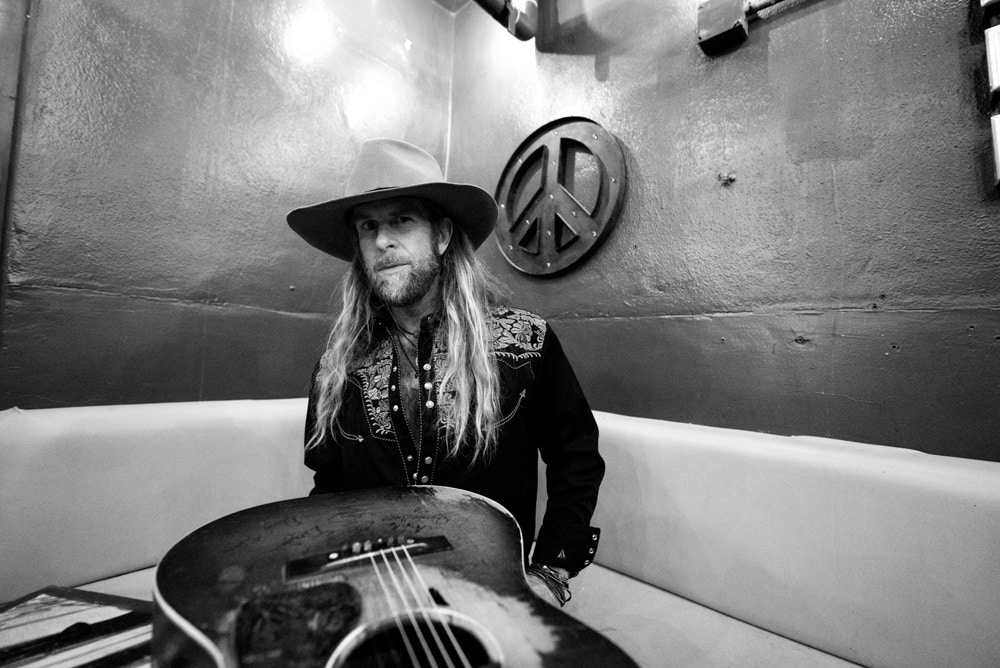
Grayson Capps could’ve gone different. The Alabama native studied theatre at Tulane University but found the mythology of the Crescent City compelling, especially the music. As a songwriter, Grayson is often associated with New Orleans, but it would be more apt to refer to him as a Gulf Coast troubadour. His songs are worn true, sometimes painfully crafted. Grayson’s voice carries the weight of years but retains the constitution of a man who cultivates hope. Though he’s continued to perform and collaborate with friends in the Alabama ensemble Willie Sugarcapps, Scarlett Roses marks the first dedicated Grayson Capps album since 2011’s The Lost Cause Minstrels. Scarlett Roses is a strong collection of narratives produced by Grayson’s wife, Grammy-winning engineer/producer Trina Shoemaker, and it reflects where the songwriter finds his heart and mind these days. Grayson Capps is raising his family on Mobile Bay, learning what it means to exist between generations, and writing the songs that make sense of it all.
AI- “If I don’t crazy, I believe I’ll go insane…” Boss, I have to tell you– I know exactly how that feels. Is that what finally got you movin’ to get Scarlett Roses off the ground? Was that album necessary for your spiritual safety, for the safety of other people around you?
GC- Oh, music is necessary for my mental health… Yeah (laughs)! Just about everything I write kinda comes out of me tryin’ to get through somethin’ myself… And come out the other end in a positive way.
Well, I was gonna ask this a little bit later, but since you put it like that… Somethin’ that you’ve spoken about in interviews and that you do address on the album… You talked about where you’re at currently, being stuck between two generations. Of course, raising your own family, and then now being in the position where you have to look after your parents. How does that feel? They don’t prepare you for that. Growin’ up, nobody ever says, “Hey! This is what’s gonna happen.”
Right. Are you experiencin’ that too? How old are you?
My birthday’s a couple days before yours, although I’ll only be 41 this year… And yeah, recently that’s been somethin’ my wife and I are havin’ to deal with– in a limited capacity.
It’s weird, man. Like you said, nobody prepares you for that. I was prepared to deal with my own children and my family, but it’s a new one… It’s part of it too. It’s like a full circle, I guess. You know, somebody’s gotta be “it” and juggle it all. And I understand my parents more. I understand my grandparents more. I remember my great-grandmother– she lived to be 105– and my granddaddy would go to her house every weekend. She lived by herself out in the woods until she was 100, but still– it never ends. He was probably 80-somethin’ (laughs), still takin’ care of his mom! So, I don’t know…(Laughs) I don’t know anything!
When you were writing, was that something that consciously fit into the music, or did you at some point in time look around and go, “Oh, that’s what that’s about”?
It’s been heavy on my mind for the past four years of just dealin’ with stuff. And somehow, bein’ able to express it feels better.
I always feel better when I can do that– when I can either talk about it or… That’s how I process stuff like that as well.
Yeah, it feels better to express it through song. I can beat the sh*t outta some concrete with a sledgehammer– that feels good too, but it’s more thorough to express it through a song where you can go through it. ‘Cause it’s not goin’ away, and it’s very real every time I sing it. And it feels good.
Let’s talk about Scarlet Roses the album. There is some amazing and tough stuff going on there. You got Texas-style narratives with some Nashville breakdowns, a little West-coast fuzz, a few dashes of just good, ole’ fashion Sun Records slap-back… Is that what you get from bein’ married to [Trina Shoemaker] one of the best engineers/producers walkin’ around today?
That’s what you get, yeah (laughs)! It’s a combination of what [Trina] would do. I think her passion is that she loves music intensely. She treats me like a client. She goes in, gets the best thing of each song, and it’s of the moment. I see her do this with every artist. She goes thoroughly into it. And her love of music is by being in that song, makin’ it the best it can– and then it’s over! She’s off to the next thing. And for people to listen to it, it makes it palatable to listen to over and over again ’cause so much love and work went into each one. Each time you hear ’em as a listener, you’re gonna probably hear somethin’ different, some level of labor and love.